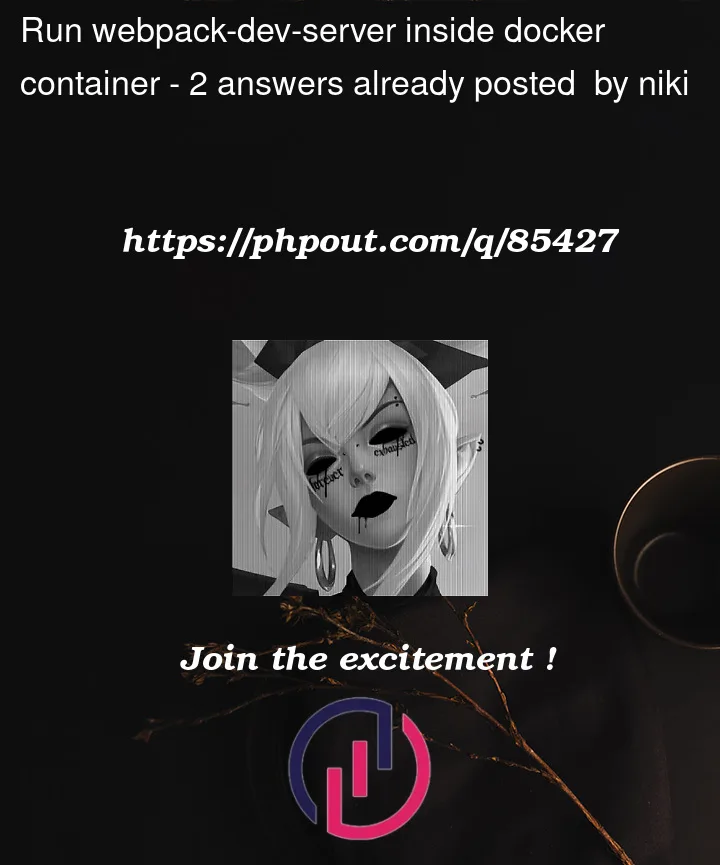I have a symfony project with docker and I would like to setup webpack-dev-server for hot reloading. I have a basic knowledge about docker, but I probably not know how it works deeply. In my php container I have yarn installed. My docker-compose file looks like:
version: '3.8'
networks:
nginx-php8-mysql8-node:
services:
nginx:
build:
context: docker/nginx
dockerfile: Dockerfile
image: nginx:1.21-alpine
container_name: nginx-container
ports:
- "8080:8080"
- "443:443"
volumes:
- ./app:${PROJECT_ROOT}
- ./app/public:${PROJECT_ROOT}/public
- /var/run/docker.sock:/tmp/docker.sock:ro
- ./docker/nginx/conf/default_template.conf:/etc/nginx/conf.d/default.template
- ./certs:/etc/nginx/certs
- ./log/nginx:/var/log/nginx
env_file:
- .env
depends_on:
- php8
command: /bin/bash -c "envsubst '$$NGINX_HOST $$PROJECT_ROOT'
< /etc/nginx/conf.d/default.template
> /etc/nginx/conf.d/default.conf
&& exec nginx -g 'daemon off;'"
networks:
- nginx-php8-mysql8-node
php8:
build:
context: ./docker/php
args:
PHP_VERSION: ${PHP_VERSION}
PROJECT_ROOT: ${PROJECT_ROOT}
container_name: php8-container
env_file:
- .env
volumes:
- ./app:${PROJECT_ROOT}:rw,cached
- ./certs:/etc/certs
depends_on:
- mysql
networks:
- nginx-php8-mysql8-node
mysql:
image: mysql:8.0
container_name: mysql8-container
command: --default-authentication-plugin=mysql_native_password --character-set-server=utf8mb4 --collation-server=utf8mb4_unicode_ci
restart: always
volumes:
- ./data:/var/lib/mysql
env_file:
- .env
ports:
- "33061:3306"
networks:
- nginx-php8-mysql8-node
If I get into the container with @docker exec -it php8-container bash and try to run webpack-dev-server I see Connection failed to ws://foo.test:8080/ws and Disconnected errors only. I tried to set host to 0.0.0.0 in the webpack configuration, and all the things I found, but never had a working configuration. Also, I have to set writeToDisk to true, or there isn’t any connecting attempt.
.configureDevServerOptions(options => {
options.allowedHosts = 'all';
options.host = '0.0.0.0';
options.devMiddleware = {
writeToDisk:true
};
});
However if I add another container to my docker-compose file like this, it works as expected.
node:
build:
context: docker/webpack
dockerfile: Dockerfile
container_name: node-container
working_dir: "${PROJECT_ROOT}"
env_file:
- .env
volumes:
- ./app:${PROJECT_ROOT}:rw
- ./certs:/etc/certs
command: yarn encore dev-server --host 0.0.0.0 --hot --port 9000
ports:
- "9000:9000"
depends_on:
- php8
networks:
- nginx-php8-mysql8-node
So my question is, what’s the difference, and why can’t I just run the dev-server without a separate container? Is there a way to make it work that way or I must edit my docker configuration?




2
Answers
I don’t see any webpack dev server starting logic in the
php8container, how do you start it? The difference is obviously you’ve exposed your ports for the nginx in the network therefore allowing to connection from browser to pass through nginx.in your case you just have to install node in your php container and also expose port 9000 if you want use this one like you did for the node container.
for php8 container you have set
context: ./docker/php
so lets edit the docker-file associated
there is multiple way to install node on another image than official one, but here is what i use myself :
in ./docker/php
add the following
ex:
to check if everything work, rebuild your docker-compose, and the following command should work :
now you have 2 options for launching the dev-server
note that you will have to execute this command everytime after you start or restart your container, and that’s not really cool
explaining how to setup a entry point will unnecessary increase the lenght of this post, its almost consist on adding the "npm run dev-server" on container start.
but i strongly advise you to keep using a independent container for using dev-server for node as it let you have access to log from it easier, and make the container restart if in any case node would crash
its a good practice to have ONE container for EACH SERVICES you could need.
and not ONE container who contain EVERY SERVICES.
in that case the day you want to upgrade to PHP "12" you could simply update your php dockerfile without have "any" conflict if the way you install node inside it, isnt working anymore.